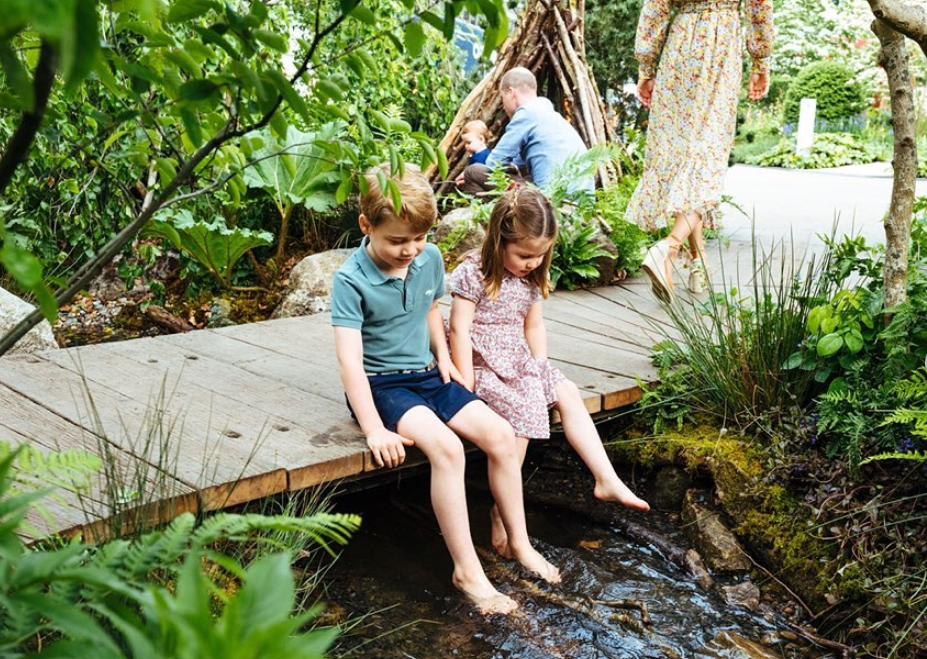Over the weekend, Kate Middleton, Duchess of Cambridge, debuted her garden design for the Chelsea Flower Show. The whole family came along making for some adorable photos including the following:
If you sighed in ecstasy over that first image, then you’re not alone. The peaceful nature of the photo gives a glimpse of classic childhood where life is carefree and full of happy wonder.
Unfortunately, it’s a type of childhood that’s hard to find these days. Gone are the times when children played kickball in the streets, roamed through the woods making forts, or regularly came home drenched from splashing in the creek.
That’s a loss the Duchess recognizes. Encouraging parents and children to get out more and take part in nature, the Duchess notes:
There’s an amazing fact I learnt recently was that 90 percent of our adult brains are developed before the age of five and what a child experiences in those really early years directly affects how the brain develops.
That’s why I think it’s so important, whether we’re parents or carers or family members, really engage in quality time with children and babies from a really young age.
I really feel that nature and being interactive outdoors has huge benefits on our physical and mental wellbeing, particularly for young kiddies.
Although much of society has abandoned efforts to get children to enjoy carefree play in the outdoors, Kate’s call for a return to nature echoes that of 19th century British educator Charlotte Mason:
It would be well if all we persons in authority, parents and all who act for parents, could make up our minds that there is no sort of knowledge to be got in these early years so valuable to children as that which they get for themselves of the world they live in. Let them once get [in] touch with Nature, and a habit is formed which will be a source of delight through life. We were all meant to be naturalists, each in his degree, and it is inexcusable to live in a world so full of the marvels of plant and animal life and to care for none of these things.
Like Kate, Mason recognizes that getting children outdoors cures many ills, including poor behavior and a listless attitude toward life:
Consider, too, what an unequalled mental training the child-naturalist is getting for any study or calling under the sun –– the powers of attention, of discrimination, of patient pursuit, growing with his growth, what will they not fit him for? Besides, life is so interesting to him, that he has no time for the faults of temper which generally have their source in ennui; there is no reason why he should be peevish or sulky or obstinate when he is always kept well amused.
And while time in the outdoors takes away precious hours from academic studies, Mason suggests it may foster greater academic curiosity and growth in the long run.
The child who sees his mother with reverent touch lift an early snowdrop to her lips, learns a higher lesson than the ‘print-books’ can teach. Years hence, when the children are old enough to understand that science itself is in a sense sacred and demands some sacrifices, all the ‘common information’ they have been gathering until then, and the habits of observation they have acquired, will form a capital groundwork for a scientific education. In the meantime, let them consider the lilies of the field and the fowls of the air.
Today, many children spend their days running to organized sports and activities, engaging in early academic experiences, and finally collapsing before an iPad or some other form of media in exhaustion. By putting our children through such paces, we believe we’re giving them the best of everything.
But are we? Would they have a greater head start on a successful, happy life if we allowed them time to be children, carefree in a natural, outdoor environment where stress is relieved and life lessons are first learned?
—
Dear Readers,
Big Tech is suppressing our reach, refusing to let us advertise and squelching our ability to serve up a steady diet of truth and ideas. Help us fight back by becoming a member for just $5 a month and then join the discussion on Parler @CharlemagneInstitute and Gab @CharlemagneInstitute!
Image Credit:
Instagram-kensingtonroyal
















Leave a Comment
Your email address will not be published. Required fields are marked with *